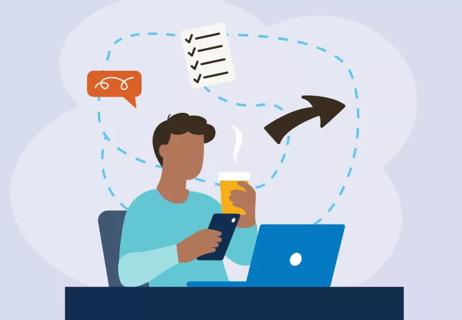This is why time flies when you’re having fun

It happens to all of us. We’re deep in conversation with a good friend … and time just melts away. Or you meant to watch an episode of a TV show before bed. Now, you’ve somehow wound up thick in the third season, and it’s almost time to get ready for work.
Advertisement
Cleveland Clinic is a non-profit academic medical center. Advertising on our site helps support our mission. We do not endorse non-Cleveland Clinic products or services. Policy
A skewed perception of time happens to everyone at some time. And for people with attention-deficit/hyperactivity disorder (ADHD) or autism spectrum disorder, keeping track of time can be particularly difficult.
Some people call it time blindness. It’s a natural consequence of hyperfocus, or becoming so engrossed in an activity that you block out everything else around you.
The passing of time goes faster when you’re engaging in something you enjoy. And it can seem to come to a standstill when you’re scrubbing the floors or stuck in traffic. There’s a scientific reason for that, says pediatric behavioral health specialist Michael Manos, PhD.
“When you’re doing something you’re very interested in, your brain engages differently than when you’re doing something that isn’t as stimulating,” he explains.
We talked with Dr. Manos about the way our brains become engrossed in certain activities and how that allows time to slip away, leaving us time blind.
“Time blindness” refers to the inability to recognize when time has passed or to estimate how long something will take.
Dr. Manos says time blindness isn’t a diagnosis or a specific symptom, it’s more just a general way of talking about the phenomenon of losing track of time. And it can be more extreme for some people.
Advertisement
“Everybody has time blindness at times,” Dr. Manos says. “We all can get caught up in something and get ‘in the zone.’ Some people with ADHD, though, are more prone to having difficulty being able to judge how long something will take to do or to lose track of time.”
People with ADHD are known for their deficits of attention. It’s right there in the name of the condition. But that’s only part of it.
On the other side of the coin, people with ADHD can also be more likely to hyperfocus on certain activities and not notice the ticking of the clock. Dr. Manos explains why.
Our brains constantly shift between two types of attention depending on the situation. They’re called automatic attention and directed attention.
Automatic attention responds to a network in your brain called the default mode. It’s your happy place. It’s what you use when you’re doing something you find interesting — maybe that’s frosting a three-tier cake or running long stretches on a beautiful summer’s day. It’s the kind of attention that lets time fly by because you’re having a good time. It’s essentially cruise control for your mind.
Directed attention is what we use when we’re engaged in things we have to do, but don’t necessarily want to do. That can include things like listening to a particularly dry lecture at school. Or filing your taxes. It’s not stimulating. And it takes considerable effort at times to keep your mind from wandering. That’s because your brain wants to find something more pleasurable so it can hop back into automatic attention and take its foot off the gas pedal.
“When you’re experiencing time blindness, it’s because you’re running on automatic attention,” Dr. Manos explains. “You’re into something and you’re excited about it. So, you’re not noticing the time.”
No one likes to use directed attention. It’s a drag. And it takes a whole lot of effort to maintain. But for people with ADHD, engaging in directed attention is even harder.
“People with ADHD tend to have very strong automatic attention. When they are doing something they like, they can more easily go deep into hyperfocus,” Dr. Manos says. “But their brains generally find it more difficult to use directed attention. So, many people with ADHD will actively avoid situations where they need to use directed attention because it’s just so hard to use.”
In other words, people with ADHD can often be labeled as being time blind because of their tendency to seek out activities that use automatic attention. So, what happens? They get in the groove, zone out and lose track of time.
When you regularly lose track of time, it can make it more difficult to get work done by a certain deadline or to be where you’re supposed to be, when you’re supposed to be there.
The key to keeping automatic attention from hijacking your agenda for the day is to find ways to divert your focus back to the moment. It’s a matter of kicking your brain out of hyperfocus by reminding it there are other things that need your attention.
Advertisement
“Putting reminders out in the physical world can bring your mind back to the present moment and keep you on task,” Dr. Manos states.
Try these tips to disengage when automatic attention has kicked into overdrive:
We all can lose track of time sometimes. And when it’s because you’re doing something fun, it’s not all bad. But if it’s getting in the way of other priorities in your life, it’s time to consider some changes. If you’re living with ADHD and experiencing time blindness that’s affecting your ability to get through your day-to-day, talk with your healthcare provider about your concerns.
Advertisement

Delivered every Tuesday!
Sign up for our Health Essentials emails for expert guidance on nutrition, fitness, sleep, skin care and more.
Learn more about our editorial process.
Advertisement

Both meds have similar benefits and side effects

Start by doing just one small thing first, and then, check it off your list

Including forgetfulness, procrastination, chronic restlessness and lack of following through

Using time management tools, adopting new approaches and allowing for a little grace can help meet deadlines and finish tasks

Boys might seem disruptive, while girls might seem inattentive, but ADHD isn’t a gender-specific condition

Most recommended precautions center around minimizing bruising or swelling

Even one drink can have an impact on your cognitive function leading to slurred speech, blurred vision and impaired memory

Type 2 diabetes isn’t inevitable with these dietary changes

Applying a hot or cold compress can help with pain